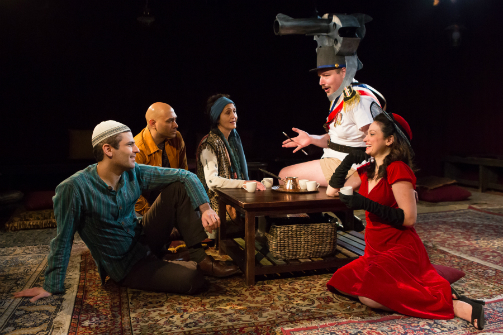
The Strangest
By Betty Shamieh; Directed by May Adrales
Produced by Semitic Root with Paradox Productions
Off Off Broadway, Play
Runs through 4.1.17
The Fourth Street Theatre, 83 East 4th Street
by Ran Xia on 3.22.17
 July Henly-Cohn, Andrew Guilarte, Jacqueline Antaramian, Brendan Titley, and Roxanna Hope Radja in The Strangest.
July Henly-Cohn, Andrew Guilarte, Jacqueline Antaramian, Brendan Titley, and Roxanna Hope Radja in The Strangest.
Photo by Hunter Canning.
BOTTOM LINE: Inspired by Camus' The Stranger, Betty Shamieh's play invites the audience to experience a traditional coffeehouse storytelling event where a murder mystery, as well as the power of the defenseless, is elaborated.
Storytellers are revered in Arab culture for their transformative powers, and the form has ancient Arabic roots, reaching all the way back to Scheherazade’s 1001 tales of spun gold, which stopped Shahryar the cruel from slaughtering his virgin wives. And then there’s the coffeehouse storytelling competition: a national pastime, a sport, a cultural identity, and the context of Betty Shamieh’s The Strangest. The stage of the Fourth Street Theatre is transformed into a typical Arab coffeehouse, where the audience is seated around the performers. In a style much like how Homer delivered his epics, the storytellers bring words to life with their charisma alone (or possibly with help of the ghosts in their tales).
Except storytelling is now a male privilege. So when Umm (Jacqueline Antaramian) enters the oratorical arena, she must defend her pedigree: "I am the daughter of the best Storyteller in Algeria and the wife of the only man who ever beat him." She also gives reasons for her odd entrance and her role as a grieving mother in the tragedy she brings forth: the story of her family, at the end of which her son dies, shot down by a Frenchman for no apparent reason. "Because it is always a mother’s fault when a child dies," she insists as she starts to weave an invisible tapestry of the past, present, and future amidst the aroma of coffee, spice, and memories of happy days. Umm’s is a gigantic story, enveloping us with a whole universe of fascinating intrigue; it’s also like a seed which blossoms like a lotus flower in the desert, from which seeps the nectar of hope and perseverance of a nation at the cusp of revolution.
In her story, Umm presents her three sons as monkeys "because the French call us that." There is Nader (Juri Henly-Cohn), the brilliant aspiring artist favored by Jean Genet; Nouno (Louis Sallan), the submissive shoemaker; and Nemo (Andrew Guilarte), the hotheaded thief. Respectively they represent "the good Arab, the harmless Arab, and the bad Arab." There’s also Layali (Roxanna Hope Radja), the fourth "have sex with no evil" monkey, whom Umm calls the obligatory "babe" of the murder mystery. Layali is a temptress and catalyst of the events that ultimately lead to the death of Umm’s son.
The chronicles of Umm’s family are juxtaposed with the racial conflicts between the French and the Algerians, five generations into the French colonization. Family patriarch Abu (Alok Tewari), an old man now reduced to muttering the same speech from a fleeting memory, used to be an honored orator, and in his prime had saved half the city’s population by negotiating the Algerians’ surrender to the French. Abu points out that the French speak to the Algerians "only in the language of the gun." And in Shamieh’s absurdist story-verse, the Frenchman named Gun (Brendan Titley) does exactly that, replacing each syllable with "bang," the sound of a gunshot. He also wears a comically enlarged pistol barrel.
Each of Shamieh’s characters (except Gun, of course) is relatable, flawed, and complex, especially the women. They seem to thoroughly understand their mediating roles between the two conflicting sides. Antaramian’s captivating storyteller Umm shifts between the world of the coffeehouse and the world of her tale seamlessly. The grieving mother to her sons, the loving wife to Abu, the understanding aunt to Layali (an understanding that is blended with hatred and blame), as well as the impassioned Algerian patriot: all aspects of the character are vividly and effortlessly delivered. And just as Antamarian deserves an ovation each night, so does Umm deserve to win the storytelling championship, a competition she isn't even allowed to enter.
Radja’s portrayal of Layali can only be described as fierce: the girl in a red dress is frightfully straightforward, and manipulative with her desires. She is simultaneously naïve and cynical, proud and unyieldingly loyal to her family and cultural identity, yet seemingly selfish as she wants to become a French citizen in order to be rid of poverty. The rest of the cast is also a stellar bunch. Guilarte, Henly-Cohn, and Sallan portray Umm’s three sons "as different in character as night is to day, day is to dusk, dusk is to dawn." And Tewari’s Abu, both as the dazed old man and the charismatic orator, is the embodiment of a history of oppression of the Algerians. The climax of the present is overlaid with a gut-wrenching flashback of Abu pleading with his brothers not to resist the French’s humiliation, urging them to declare surrender in order to survive.
Shamieh’s absurdist play is based on the nameless Arab inexplicably killed by a Frenchman in Camus’ novel The Stranger. Brilliantly directed by May Adrales, The Strangest is ferociously funny. The production is also dazzling in its style: the original music and sound design by Charles Coes and Nathan A. Roberts breathes life into the story and gives it incredible auditory dynamics. Aaron Porter’s nuanced and transformative lighting, Daniel Zimmerman’s beautiful scenic design, and Becky Bodurtha’s exquisite costumes also enhance the immersive experience.
The Strangest tells a story that’s alarmingly familiar: the racism and oppression Algerians experienced is an unfortunate recurring theme in those parts of the world where the powerful enter with killing machines, driving out the natives and leaving them with trails of blood and tears. But The Strangest is also about the ultimate victory of the defenseless, and thus ends on a positive note. Umm’s victory comes from telling her difficult and unwanted story. "Your greatest weapon is the ability to think," repeats Abu. And the story is an ode to any people resisting tyranny: they might be defenseless, but "to be defenseless is not the same thing as being defeated." As Umm shows, strength lies in the ability to remember and persist.
(The Strangest plays at The Fourth Street Theater, 83 East 4th Street, through April 1, 2017. The running time is 1 hour 30 minutes without intermission. Performances are Mondays, Tuesdays, Thursdays, Fridays, and Saturdays at 7:30, and Sundays at 5. Tickets are $25 – $45 and available at brownpapertickets.com.)
The Strangest is by Betty Shamieh. Directed by May Adrales. Set Design is by Daniel Zimmerman. Lighting Design is by Aaron Porter. New Music and Sound Design is by Nathan A. Roberts & Charles Coes. Production Manager is Jay Sterkel. Stage Manager is Megan Sprowls.
The cast is Jacqueline Antaramian, Andrew Guilarte, Juri Henly-Cohn, Roxanna Hope Radja, Alok Tewari, Louis Sallan, and Brendan Titley.

